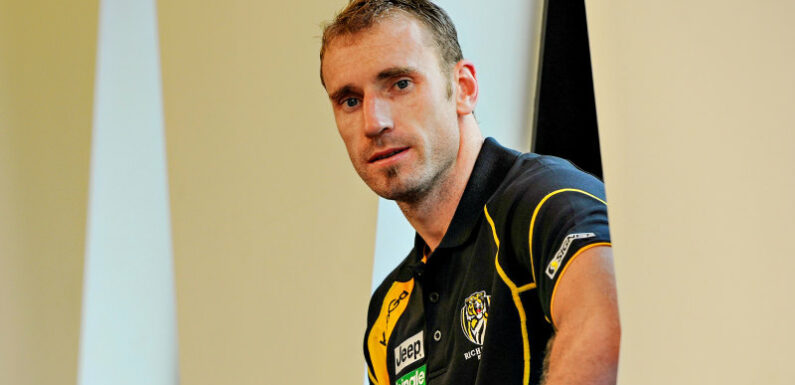
Save articles for later
Add articles to your saved list and come back to them any time.
In the years before AFL player Shane Tuck took his own life, the suspected impacts of head knocks during his sporting career became so great he began hearing voices and withdrawing from family.
From 2006, his wife Katherine reported her husband developing rituals and obsessive behaviour around health and fitness before, a decade later, the father began requiring repeated hospital treatments as his condition worsened.
An inquest is being held into the death of former AFL player Shane Tuck.Credit: Sebastian Costanzo
On July 20, 2020, Tuck was found dead at his parents’ home. A post-mortem examination found he had severe chronic traumatic encephalopathy (CTE) at the time of his death – a type of brain degeneration thought to be caused by repeated head traumas.
On Wednesday, the first day of an inquest into Tuck’s death, State Coroner John Cain heard that while the prevalence of CTE was not known in Australia – it can only be diagnosed after death – the condition had received more attention in recent years.
“By the age of 10, one in five children will experience concussion and 25 per cent result from sport participation,” counsel assisting the coroner Gideon Boas said.
Counsel assisting Gideon Boas at the inquest on Wednesday.Credit: Nine News
“The public interest in any measures that address the risk of head trauma in Australian rules football resonate deeply in the community. How professional boxing is regulated also resonates with the community. Legal punches that cause damage score the highest.”
Tuck had a decorated AFL career, playing 173 games with Richmond from 2004 to 2013.
Boas said that following head knocks while playing sport, Tuck’s wife recalled him going straight home and to bed early.
In 2011 – two years before his retirement – Tuck told a post-AFL season medical assessment he had suffered concussions.
After football, he had a brief professional boxing career from 2015 to 2017, during which he suffered a knockout that left him hospitalised.
By 2018, Tuck had begun hearing voices and, as his condition deteriorated over the years, he was repeatedly hospitalised after experiencing hallucinations, suicidal thoughts and voices commanding him to kill himself.
He died by suicide in 2020 in the storeroom of his parents’ home. He was 38.
A neuropathologist at the Australian Sports Brain Bank later found Tuck had the most severe case of CTE they had seen.
Tuck is one of five former AFL footballers to be diagnosed with CTE after their deaths, including Graham “Polly” Farmer, Danny Frawley and Murray Weideman.
Tuck’s family watched day one of the inquest remotely, with the coroner acknowledging that Thursday would mark the third anniversary of his death.
The inquest heard it is estimated that 100,000 sports-related concussions occur in Australia each year, mostly in community sport, and most go undocumented.
While CTE cannot be diagnosed during life, Boas said there were clinical features that could be used to help predict its likelihood in a living patient.
Initial symptoms of CTE, Boas said, can include issues with concentration and memory, and longer-term impacts such as impulsive behaviour, explosiveness, anxiety and depression. It has also been diagnosed in former rugby league players.
Tuck on the field for Richmond.Credit: Joe Armao
“Studies suggest at least 17 per cent of people who experience repeated concussions, or mild traumatic brain injury, develop CTE,” Boas said.
Cain is expected to investigate whether Tuck suffered concussion and head injuries during his AFL and professional boxing careers; what, if any, connection can be established between those injuries and his diagnosis of CTE; and what connection, if any, can be established between Tuck’s CTE diagnosis and his death.
As part of the inquest, which will run over the next week, the coroner is also expected to examine the United States National Football League’s response to brain injury and CTE.
In 2021, the AFL strengthened its protocols around head knocks and concussions, releasing new guidelines for the match review officer and tribunal to follow, with head-high contact to have a stricter interpretation attached to it.
In a statement to this masthead, Greg Griffin – the lawyer for Tuck’s wife – said his client had chosen not to be part of the inquest due to concerns about the scope of the inquiry.
The inquest continues.
If you or anyone you know needs support call Lifeline on 131 114.
The Morning Edition newsletter is our guide to the day’s most important and interesting stories, analysis and insights. Sign up here.
Most Viewed in National
From our partners
Source: Read Full Article


